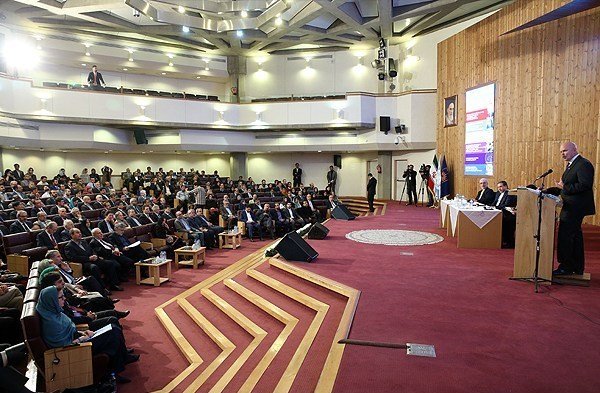71st UN anniversary marked in Iran

TEHRAN – On Sunday, the United Nations Office in Tehran marked the 71st anniversary of the biggest international body with some high ranking officials such as Iran’s head of Department of Environment Masoumeh Ebtekar, Deputy Foreign Minister Abbas Araqchi, UN resident coordinator in Iran Gary Lewis, and a number of diplomatic corps and ambassadors in attendance in Tehran.
Annually, the United Nations celebrates October 24 as UN Day.
Gary Lewis, the first speaker of the event, opened his speech by reading Secretary-General, Mr. Ban Ki-Moon’s statement on the occasion.
Lewis then read the Sustainable Development Goals of the UN, adopted by all UN member states, calling the 17 goals “a meaningful set of objectives which represents the fullest, most complete plan yet to sustain our future on this fragile, endangered planet.”
The goals, to be met by 2030, are aimed at eradicating poverty, fighting inequality, building peaceful, inclusive, and resilient societies, and securing the future of the planet and the wellbeing of future generations, he noted.
Lewis also announced that Iran has decided to deliver a report on its SDG performance in New York during the 2017 UN High Level Political Forum, which is a central platform for following up and reviewing implementation of the SDGs.
Through the UN Development Assistance Framework – or UNDAF, United Nations will work on implementation of SDGs in Iran, Lewis said, adding that UNDAF was signed in the presence of Abbas Araqchi and will start its mission at the beginning of 2017.
“In the next five years, from 2017 to 2021, the UNDAF will work on four areas in Iran: environment, health, a resilient economy and drug control.”
The UN resident coordinator in Iran also expressed his gratitude to his 400 working team members in the country, out of whom, he said, “90 percent are Iranians.”
Lewis reinstated the goals of his UN team in Iran as peace, justice, human rights and development.
The UN coordinator in Iran concluded his speech by reading one of Saadi’s poems in Farsi, hung at the entrance of the UN Headquarters in New York.
To achieve sustainable development, a secure region is needed to be built first: Ebtekar
The second speaker of the event, Iran’s’ head of the Department of Environment, called removing the terrorism and extremism from the region a prerequisite to sustainable development plans.
Pointing to UN mission in the world, Ebtekar urged greater efforts to restore peace to the Middle East.
Masoumeh Ebtekar, who is also Iran’s vice president, went on to say Iran is committed to press ahead with the implementation of the SDGs in line with the Rouhani administration.
“Iran has an SDGs committee for two decades”, she said, underscoring done in all different sectors of the ministry have been tasked with plans to implement.
The Iranian official also expressed hope for the exchange of views with the international community.
Madam Ebtekar pointed to two environmental achievements this year, 2016, the Paris agreement on climate change and the more recent agreement on Ozone layer, inviting the people to put aside avarice and selfishness to save the environment.
She voiced grave concern over the published data on the Living Planet Index on extinction of plants and water animals due to human activities and hoped the statistics act as “a wakeup call” for the people around the world to take the matter seriously and wake up to the reality that they need to “drastically change behavior patterns.”
“No country is an isolated land, we live on the same ship and have common destiny and need to change trends.”
Pointing to unfair imposed sanctions on Iran, the official said the country was not able to enjoy environmental funds provided by the Global Environment Facility (GEF), a global financial organization, and hoped for the issue to get resolved.
UN should take action to end wars and conflicts: Araqchi
Iran’s Deputy Foreign Minister Abbas Araqchi, as the last speaker of the UN Day, said although the UN has made landmark environmental achievements, other issues such as humanitarian crises, conflicts, and wars are still left for the organization to resolve.
For instance, Araqchi said, the Syrian conflict has taken many lives and displaced millions, but “the security system of the UN is yet to arrive at a solution for the country.”
The crisis, the top official said, “has left the country at the mercy of Daesh”, while the UN can play a major role in bringing peace back to the country and providing humanitarian aid to the desperate Syrians.
In Yemen, Araqchi noted, “the situation is equally desperate’ as savage killing of the Yemeni people by the Saudi-led coalition continues nonstop.
The world expects the UN to take steps to stop the bombardment of Yemen and get humanitarian aid to this “forgotten land.”
